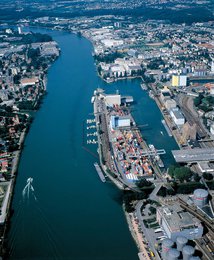Cross-border economic development
Keys to success
KNOWLEDGE of THE CROSS-BORDER TERRITORY, getting to know EACH OTHER WITHIN IT
Territories concerned by cross-border economic development can range from relatively small areas in sparsely populated or relatively inaccessible spaces (rural areas, mountain ranges), to larger spaces (urban areas). Articulation between territorial scales is also important, for example between the cross-border labour market catchment area or cross-border conurbation (everyday living space of inhabitants), and the cross-border region (a scale more suitable for businesses). In the context of globalisation, the concept of the functional region (in some cases metropolitan) seems to be the most relevant.
For public authorities, a joint assessment of the strengths, weaknesses, and complementarities of the different sides of the cross-border territory, and of the economic flows that characterise it, can demonstrate the interest of developing cooperation, for example around cross-border research or competitiveness clusters or centres. Such an assessment requires the collection of harmonised and comparable economic data at the cross-border level. This is an extremely complicated process because of the national structuring of statistics systems.
Inadequate knowledge of how the systems work on the other side of the border is a major hindrance to cooperation. Systems are often very different (administrative, legal, and technical cultures, business support structures, market access, actors concerned, the competences of the different levels of governance). In order to achieve mutual understanding, any cooperation must start by acquisition of knowledge in the areas mentioned above, to which should be added intercultural and linguistic skills, etc.
The research project "CBCED - Cross-Border Cooperation and Entrepreneurship Development[GP1] " presents an interesting analysis of the potential of cross-border entrepreneurship for the development of European border regions (Finland, Germany, Poland, Greece, Bulgaria and Estonia).
Constant discussion and extensive communication between actors enable them to respond better to challenges and overcome obstacles. Shared knowledge of the territory aside, the first step for actors is to learn to get to know each other.
Involving economic institutions (chambers of commerce and industry, development agencies, etc.) on both sides of the border facilitates the sharing of information and helps the businesses concerned to understand how things work in the neighbouring country. Support from relevant trade associations can also help to mobilise businesses for cooperation.
The European exchange program "Erasmus for Young Entrepreneurs" gives young and aspiring entrepreneurs the opportunity to train with experienced entrepreneurs leading small businesses in other countries of the European Union. The Pyrenees-Mediterranean Euroregion is one of the local contact points for the program.
The first action to take is to organise communication between all bodies involved in the economic development of the areas concerned, first of all by listing all actors and encouraging informal meetings.
The research project "CBCED - Cross-Border Cooperation and Entrepreneurship" presents an interesting analysis of the potential of cross-border entrepreneurship for the development of European border regions (Finland, Germany, Poland, Greece, Bulgaria and Estonia).
Constant discussion and extensive communication between actors enable them to respond better to challenges and overcome obstacles. Shared knowledge of the territory aside, the first step for actors is to learn to get to know each other.
Involving economic institutions (chambers of commerce and industry, development agencies, etc.) on both sides of the border facilitates the sharing of information and helps the businesses concerned to understand how things work in the neighbouring country. Support from relevant trade associations can also help to mobilise businesses for cooperation.
The European exchange program "Erasmus for Young Entrepreneurs" gives young and aspiring entrepreneurs the opportunity to train with experienced entrepreneurs leading small businesses in other countries of the European Union. The Pyrenees-Mediterranean EGTC is one of the local contact points of the program.
The first action to take is to organise communication between all bodies involved in the economic development of the areas concerned, first of all by listing all actors and encouraging informal meetings.
Organising the governance of cross-border economic development
In order to achieve real cross-border governance of economic development, it is important to involve all relevant territorial stakeholders (companies, research centres, universities, public bodies, chambers of commerce and industry, development agencies etc.), active within the cross-border territory. Because of the heterogeneity of said stakeholders and the differences between systems and levels of competence on either side of the border, it is important to involve the various levels of local, regional, national and even European authorities. The concept of the functional region again seems most appropriate for the networking of all actors concerned by economic development. To achieve this, the networking of cross-border clusters needs to be supported financially.
One priority area for cooperation is of course innovation. Cooperation between SMEs in fast-developing sectors (new technologies, logistics, etc.) would be of interest. A cross-border cluster bringing together joint and/or complimentary skills can facilitate this approach. The involvement of the academic and research sector is crucial, both for work on the content and for training the necessary qualified personnel. It is important to facilitate exchanges between universities and research centres and foster innovation and technological development as well as their dissemination in a cross-border context. It is therefore necessary to encourage synergies between sources of innovation and identify cross-border centres of excellence in the required sectors.
Cross-border Euroregional strategies for economic development and innovation are essential for addressing the economic development of the cross-border territory in an integrated manner.
Finally, cross-border company takeovers can be a solution for the retirement of owners of dynamic SMEs that participate in the economic development of the cross-border territory.


